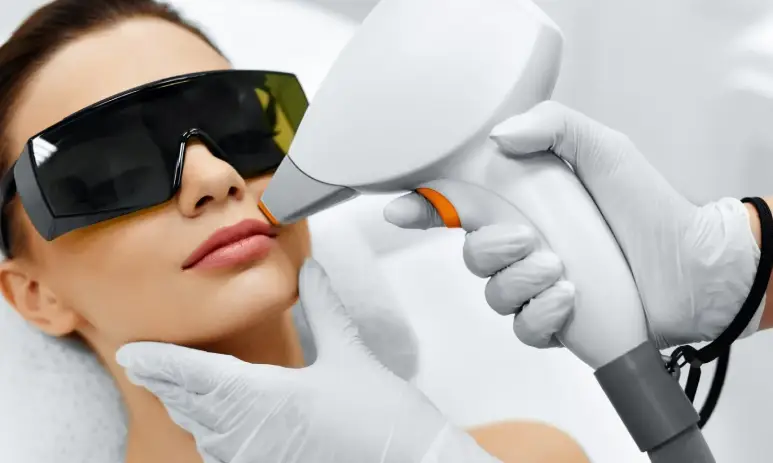Who does laser hair removal work on?
Laser hair removal does not yield identical results for everyone. Several factors can influence the effectiveness of laser treatment. These factors include skin color, hair color, hair thickness and type, as well as the capability of the laser technology being used.
For example, individuals with light skin and dark hair typically respond well to this method because the color contrast between the hair and skin allows the laser to be better absorbed, resulting in more effective treatment. However, in cases where there is little contrast between the skin and hair color, such as dark skin and dark hair, the laser may be less effective and could potentially cause damage to the skin.
Additionally, laser hair removal may not be as effective on very fine hairs or very light hair colors, such as thin or white hairs, as the laser may have difficulty detecting light colors and thin hairs may not have sufficient pigment to absorb the laser energy.
Therefore, it’s important to consult with a specialist before undergoing this treatment to ensure whether laser hair removal is suitable for you and what type of laser would be appropriate.
People taking specific medications
Various medications can have different effects on the performance of laser hair removal. Some medications may increase skin sensitivity to laser or alter skin pigmentation, affecting the effectiveness of laser treatment.
Your physician should be aware of any medications you are taking as this information can impact your treatment plan. If you are taking medications that may have side effects with laser, your doctor may recommend temporarily discontinuing them or consider alternative options for hair removal.
In general, by informing your doctor about your medical history and medications you are taking, you can mitigate the risk of side effects and increase the likelihood of successful laser hair removal.
Individuals with specific skin conditions
Certain medical conditions such as skin diseases can affect the outcomes of laser hair removal. Skin conditions like eczema, psoriasis, and vitiligo can increase skin sensitivity and irritation, potentially leading to various side effects from laser hair removal. Additionally, individuals with autoimmune diseases like lupus or rheumatoid arthritis may be at increased risk of skin irritation and even skin ulcers.
If you or someone considering laser hair removal has any of these conditions, it’s important to consult with your physician. Your doctor can assess your skin condition and provide necessary recommendations for undergoing this procedure. Your physician may advise waiting until your skin improves or suggest alternative methods for hair removal.
Providing comprehensive information about your skin condition and any medical conditions you may have to your doctor can help prevent potential side effects and ensure the most appropriate approach for achieving desired results.
Individuals with hormonal disorders
People with hormonal imbalances may experience different outcomes from laser hair removal. Hormonal disorders can lead to unwanted hair growth in various body areas, including the face, neck, chest, and back. Some of these hormonal disorders include polycystic ovary syndrome (PCOS), thyroid disorders, and menopause.
In such cases, laser treatment may be less effective or require repeated sessions. It’s important to inform your laser physician about any hormonal disorders before treatment so that they can devise a suitable treatment plan for you. They may suggest alternative options for hair removal or recommend waiting until your hormone levels stabilize.
Therefore, while laser hair removal can be an effective solution for many individuals, those with hormonal imbalances may experience different results. Ensuring successful and safe treatment requires direct and open communication with your physician. By providing your doctor with a comprehensive medical history and hormonal disorders you may have, you can select the best approach for you.
Individuals prone to laser-related injuries
While laser hair removal is an effective method for hair removal, some individuals may be at risk of skin damage or other adverse effects from laser use. This includes individuals with dark skin who are more prone to skin damage and pigment changes from laser treatment. Additionally, individuals with a history of keloid scarring or increased sensitivity to light may be at higher risk of skin injury.
Your laser physician should be informed about any skin or medical conditions you have. They may recommend alternative options for hair removal or advise you to wait until your skin heals before undergoing any laser treatment.
As a result, laser treatment can be an effective and safe solution for removing unwanted hair, but ensuring successful treatment requires direct and ongoing communication with your physician. By informing your doctor about your medical history and any skin issues you may have, you can prevent skin damage and other side effects and choose the best method for you.
Individuals with hormonal issues
People experiencing hormonal imbalances may have varying experiences with laser hair removal. Hormonal imbalances can lead to unwanted hair growth in different body areas, including the face, neck, chest, and back. Some of these hormonal issues include polycystic ovary syndrome (PCOS), thyroid disorders, and menopause.
However, laser treatment can still be an option for removing unwanted hair, but it may be less effective or require more frequent treatment sessions. To ensure a successful and safe procedure, it’s important to inform your laser physician of any hormonal imbalances or other medical issues you have. They may suggest alternative options for hair removal or advise you to wait until your hormone levels stabilize.
In general, collaborating with your physician and providing them with information about your medical conditions can help you choose the best approach and prevent potential side effects.
Laser treatment before reaching puberty
Undergoing laser treatment before reaching puberty may not be suitable. During this stage, the body undergoes significant hormonal changes that can lead to increased hair growth. Additionally, children’s skin may be more sensitive and prone to skin damage.
Therefore, it’s better to wait until the individual reaches adulthood and their body stabilizes before considering any laser procedure, especially for children and teenagers. For younger individuals, using devices such as fractional CO2 lasers, which have minimal risk of skin damage, may be preferable.
Ultimately, to determine whether laser treatment is appropriate, it’s best to talk to your doctor and discuss your medical history and age with them. They can guide you on whether laser treatment is suitable at this stage and suggest other options if necessary.
Laser treatment in the elderly
Laser hair removal can be a safe and effective option for removing unwanted hair in the elderly. However, as age increases, our skin becomes thinner and more delicate, making it more susceptible to damage. Therefore, choosing a suitable laser method for the elderly, especially considering individual skin conditions, requires careful attention and consideration.
To ensure safe and successful treatment, it’s important to discuss any medical conditions, medications, and medical history with your physician. Your doctor can guide you based on your condition and recommend whether laser treatment is appropriate for you and whether there are alternative options that may be more suitable.
In general, laser treatment in the elderly can be an effective and safe solution with careful consideration of specific circumstances and mutual collaboration with the physician.
Laser treatment in pregnant women
Laser treatment can be a safe and effective way to address skin concerns during pregnancy, but it’s important to consult with a specialist before any cosmetic procedure during this period. Some laser treatments may not be suitable, and your doctor can recommend the best options for you.
Additionally, before making a decision, it’s important to consider potential risks and benefits. Some laser methods during pregnancy may cause side effects or skin irritation that could pose risks to the health of the mother and baby. Therefore, decision-making should be done carefully and with medical consultation, and the health of the mother and baby should always be the top priority.
Who is suitable for laser treatment?
“Laser can be a very effective solution for those looking for a permanent way to remove unwanted hair. However, before making a decision, it’s important to consider various factors.
Skin type: Laser works better for individuals with light skin and dark hair. People with darker skin may be at higher risk of complications such as scarring or skin discoloration.
Targeted area: Although laser can be used for various areas, it’s more commonly used for areas such as the face, underarms, and legs.
Cost: The cost of laser treatment may vary, and it’s important to consider it before making a decision.
Additionally, consulting with an experienced technician or physician can help you understand the risks and benefits of laser and make the best decision. Also, choosing a reputable and experienced center is very important. This method is much more effective for individuals with light skin and dark hair.”





